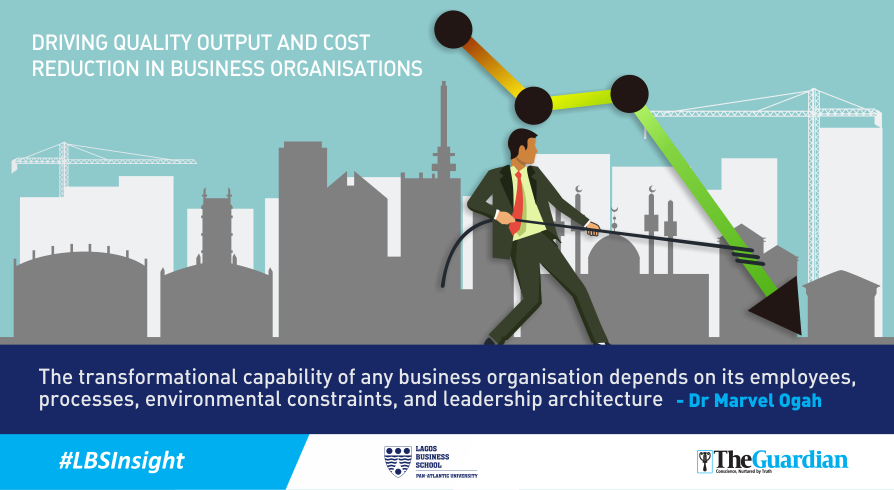Driving Quality Output and Cost Reduction in Business Organisations
Operationally, balancing quality of outputs with low cost is a huge challenge in most business organisations; however, this seemingly difficult feat is achievable and realistic in the Nigerian business environment. Value is the ratio of perceived benefits over total cost incurred in providing the service offering or product to the customer:
Value (Quality) = Perceived benefits / Incurred costs for Outputs (Service or Product)
Among other things, if organisational customers experience more benefits at a reduced cost, the value is enhanced, but the reverse is the case in the Nigerian scenario. A significant attribute of an organisation inheres in its capability to transform scarce inputs into valuable outputs. The transformational capability of any business organisation depends on its employees, processes, environmental constraints, and leadership architecture. The cost-efficient manner of transforming scarce inputs or resources into valuable outputs also depends to a large extent on the organisational employees, processes, and leadership architecture. Most organisations can only adjust to environmental reality but cannot influence its impact on their operational efficiency regarding cost and quality. In the Nigerian business ecosystem, achieving consistent quality products or service offerings is tantamount to incurring a high cost, hence the excuse given by most of them for providing poor quality products and service offerings. However, when customers encounter organisations that consistently provide quality service or products at affordable costs, they are often amazed. A focused organisation in which its leadership architecture, employees, and processes are aligned operationally with its value-driven parameters of quality and cost reduction can, however, replicate this experience for its customers.
How can Nigerian businesses replicate value-driven organisations based on quality service offering with low costs incurred? The answers lie in its employees, processes, and leadership architecture. The Nigerian business environment, like any global business ecosystem, is fraught with constraints; a constraint is like a variable in a business equation while organisational employees, processes, and leadership architecture are constants. The variable can be manipulated to suit the peculiarities of an organisation towards attaining consistent quality at low cost and herein lies the secret behind those organisations that consistently deliver quality outputs at reduced costs. This is a tall business order, but it is achievable by exploring the outlined approaches:
Respect for Organisational Employees
The human capital constitutes an integral part of any business growth and responsiveness to customer service. According to Samuel Curtis Johnson of SC Johnson, “the goodwill of the people is the soul of any business, the rest is a shadow.” Organisational employees design, drive, and manage processes towards delivering value to the customers; processes cannot act without the intervention of a human being, hence, the need for organisational employees to be treated respectfully. When organisational employees are treated with respect, the processes become responsive, agile, and aligned with the quality and efficient delivery of value to the customer.
Focused Processes
Processes are the building blocks of operations in any organisation. Responsive processes procreate robust and focused organisations that are aligned with the delivery of quality outputs at a reduced cost and in an efficient manner. Defective and weak processes beget poor quality service offerings or products with high level of wastes; these incidents ultimately lead to high cost of operations. Moreover, when an organisation is fraught with this type of dilemma, there is a tendency to resort to unethical means of achieving cost-effectiveness in order to deliver quality outputs at a low cost. Quality of services and products from these types of organisations begins to drop with the attendant high cost of inputs. Some Nigerian organisations are in this quagmire. Unfortunately for these types of organisations, rather than look inward in their processes to seek alignment, placing blames on the external business environment becomes the norm.
Leadership that is ethically aligned to process and employees
A leadership architecture that is ethically aligned to its processes and employees will elicit quality service offerings and products efficiently and consistently. Conversely, if the leadership architecture is ethically defective, the morale and goodwill of the organisational employees would also be compromised. Moreover, if there is a misalignment between organisational employees and processes, the outcome is declining quality of services or products with attendant high operational cost of inputs and resources. Such organisations treat their suppliers, employees, and stakeholders poorly; the resultant outcomes are low morale amongst organisational employees, non-committed suppliers, graft, dying processes, declining customer service, high operational costs, high employee turnover; and inefficiency.
The external business constraint which is a constant in the value-add equation is a global phenomenon; therefore the business levers that will provide quality service or products at low costs are focused operational processes, respect for organisational employees, and a leadership architecture that is ethically sound.
Join the conversation on Twitter via @LBSNigeria and @LBSinsight
Dr Marvel Ogah teaches Operations Management at Lagos Business School


